小学英语5
牛津英语小学五年级5A知识点

Unit one重点解析1. Is there a/an.... in/on/near the...?Yes, there is. /No, there isn't.Are there any ... in the...?Yes, there are. / No, there aren't.讲解:(1)把be动词(is/ are)提到句首即可构成一般疑问句。
(2)回答时用Yes或No。
举例:Yes, there is/there are. No, there isn't/there aren't.(3)在一般疑问句中some通常变成any。
如:举例:Are there any students in the classroom?教室里有学生吗?Is there any water in the glass? 玻璃杯里有水吗?2. How many ... are there in the...? There are....讲解:本句型为there be句型的特殊疑问句形式,表示“在某处某物的数量有多少”。
(1)how many 后跟复数名词。
举例:how many reading rooms 多少个阅览室how many books 多少本书(2)特殊疑问句= how many + 名词复数+ 一般疑问语序(is/are there)。
举例:How many apples are there in the tree?树上有多少个苹果?How many books are there in the bookcase?书柜里有多少本书?(3)回答时不能用Yes或No, 要给出具体的回答。
举例:―How many students are there in the room?房间里有多少名学生?―There are two.有两名。
3. the first day of the new term 新学期的第一天讲解:“of”表示“……的”,在这里是所有格的用法,主要用于表示无生命的名词,举例:the door of the house 房子的门a map of China 一张中国地图4. the first floor 1楼讲解:“first”意思是“第一”。
小学五年级英语 重点词组
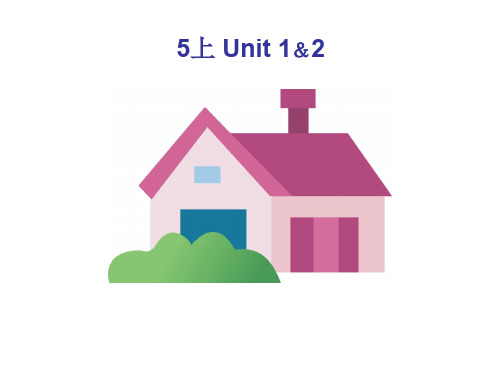
Help! Help!
Retell the story
Goldilocks is happy. There is ... Goldilocks is hungry and thirsty. There is ...
Goldilocks is tired. There are ...
Goldilocks is afraid. There are ...
There are three big trees behind our classroom.
友情提示: 1. The rabbit in a black hat looks happy.
在上面这个句子中,in并不表示方位,而 是指“穿着,戴着” 。如:
Miss Green is in green. Mr White is in a white sweater. 2. 学过的其它介词还有:at, of, for, to等。
Try to remember
Goldilocks is …. She is …. There is ….
This soup is ….
This soup is ….
This soup is ….
Try to remember
Goldilocks is tired now. There are three beds in the room.
Is there an orange on the plate? No, there isn’t.
near:在……附近。如:
There isn’t a bike near the house. under:在……下面。如:
There aren’t any shoes under my bed. behind:在……后面。如:
小学5年级英语动词用法知识点归纳
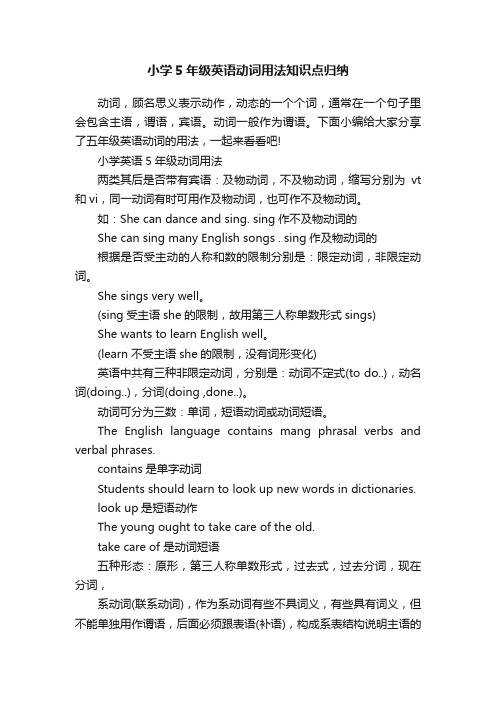
小学5年级英语动词用法知识点归纳动词,顾名思义表示动作,动态的一个个词,通常在一个句子里会包含主语,谓语,宾语。
动词一般作为谓语。
下面小编给大家分享了五年级英语动词的用法,一起来看看吧!小学英语5年级动词用法两类其后是否带有宾语:及物动词,不及物动词,缩写分别为vt 和vi,同一动词有时可用作及物动词,也可作不及物动词。
如:She can dance and sing. sing作不及物动词的She can sing many English songs . sing作及物动词的根据是否受主动的人称和数的限制分别是:限定动词,非限定动词。
She sings very well。
(sing受主语she的限制,故用第三人称单数形式sings)She wants to learn English well。
(learn 不受主语she的限制,没有词形变化)英语中共有三种非限定动词,分别是:动词不定式(to do..),动名词(doing..),分词(doing ,done..)。
动词可分为三数:单词,短语动词或动词短语。
The English language contains mang phrasal verbs and verbal phrases.contains是单字动词Students should learn to look up new words in dictionaries.look up是短语动作The young ought to take care of the old.take care of 是动词短语五种形态:原形,第三人称单数形式,过去式,过去分词,现在分词,系动词(联系动词),作为系动词有些不具词义,有些具有词义,但不能单独用作谓语,后面必须跟表语(补语),构成系表结构说明主语的状况,性质,特征情况状态系动词:表示主语状态,只有be一词:如:He is a teacher . is 与补足语一起说明主语的身份。
小学五年级英语主要知识点有哪些
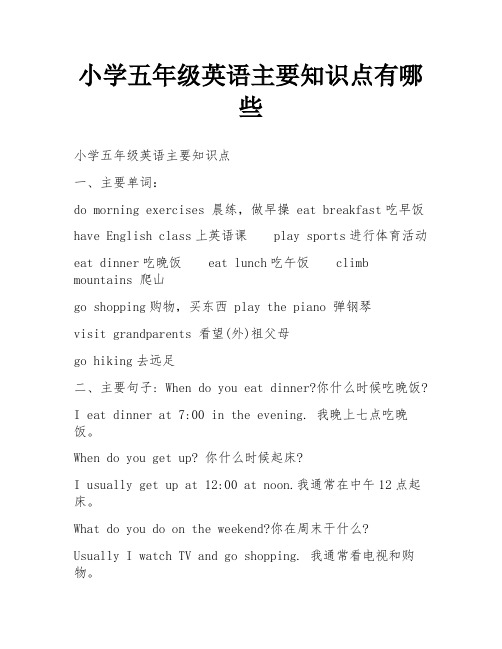
小学五年级英语主要知识点有哪些小学五年级英语主要知识点一、主要单词:do morning exercises 晨练,做早操 eat breakfast吃早饭have English class上英语课play sports进行体育活动eat dinner吃晚饭eat lunch吃午饭climb mountains 爬山go shopping购物,买东西 play the piano 弹钢琴visit grandparents 看望(外)祖父母go hiking去远足二、主要句子: When do you eat dinner?你什么时候吃晚饭?I eat dinner at 7:00 in the evening. 我晚上七点吃晚饭。
When do you get up? 你什么时候起床?I usually get up at 12:00 at noon.我通常在中午12点起床。
What do you do on the weekend?你在周末干什么?Usually I watch TV and go shopping. 我通常看电视和购物。
Sometimes I visit my grandparents.有时候我去看望我的外祖父母。
I often play football. 我经常踢足球。
Sometimes I go hiking.有时候我去远足。
三、同义词eat breakfast—have breakfast eat lunch—have lunch eat dinner—have dinner play sports—do sportsusually—often复数形式:policeman—policemen policewoman—policewomen现在分词:tell—telling三单:say—says同义句:What do you do ? ---What are you? 你是干什么的?四、表示频度的副词:always 总是,一直usually 通常,常常often 经常sometimes 有时候五、以复数形式出现的词组:visit grandparents plant trees六、介词后跟表示时间的词语时,表示在某年、某月、某个季节,某个时候(在上午,在下午,在晚上)用in;表示在某一天,在星期几用on,在具体的几点几分用at.七、too 和either的用法区别:too和either都是“也”的意思,但too用于肯定句,either用于否定句。
人教版小学英语五年级单词表
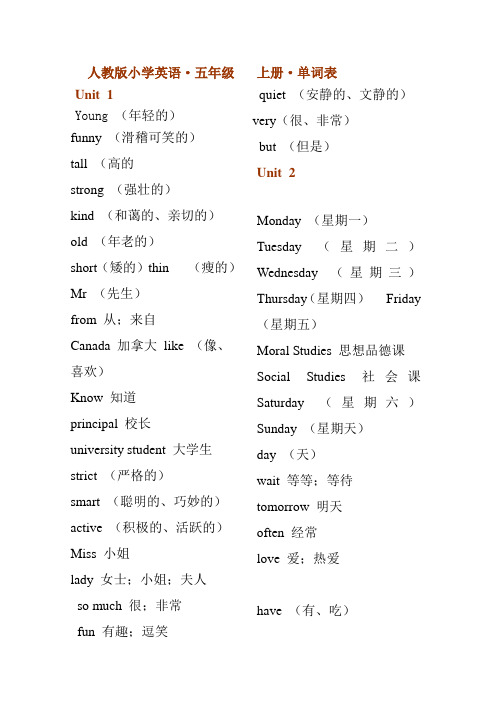
人教版小学英语·五年级上册·单词表Unit 1Young (年轻的)funny (滑稽可笑的)tall (高的strong (强壮的)kind (和蔼的、亲切的)old (年老的)short(矮的)thin (瘦的)Mr (先生)from 从;来自Canada 加拿大like (像、喜欢)Know 知道principal 校长university student 大学生strict (严格的)smart (聪明的、巧妙的)active (积极的、活跃的)Miss 小姐lady 女士;小姐;夫人so much 很;非常fun 有趣;逗笑quiet (安静的、文静的)very(很、非常)but (但是)Unit 2Monday (星期一)Tuesday (星期二)Wednesday (星期三)Thursday(星期四)Friday (星期五)Moral Studies 思想品德课Social Studies 社会课Saturday (星期六)Sunday (星期天)day (天)wait 等等;等待tomorrow 明天often 经常love 爱;热爱have (有、吃)on (在…..时候)do homework (做作业)watch TV (看电视)read books (读书)Unit 3cabbage 洋白菜;卷心菜pork 猪肉mutton 羊肉eggplant (茄子)fish (鱼)green beans (青豆)tofu (豆腐)potato (土豆)tomato (西红柿)for (为)lunch (中餐)we(我们)menu 菜单sound 听起来Mew Mew 猫咪healthy 健康的tasty (好吃的)sweet (甜的)sour (酸的)fresh(新鲜的)salty (咸的)favourite (最喜欢的)they are (他们是)fruit (水果)grape (葡萄)now 现在have to 不得不eat 吃Unit 4Empty the trash 倒垃圾Cook the meals (烧饭)water the flowers (浇花)sweep the floor (扫地)clean the bedroom (打扫卧室)helpful 有帮助的at home 在家里ill 有病的wash the windows 擦窗户just do it 就这么干吧do housework 做家务make the bed(铺床)set the table (摆饭桌)wash the clothes (洗衣服)do the dishes (洗碗碟)put away the clothes 收拾衣服have a try 试一试robot 机器人play chess 下棋use a computer (使用计算机)Unit 5air-conditioner 空调curtain(窗帘)trash bin (垃圾箱)closet (壁橱)mirror(镜子)end table (床头柜)look at 看一看own 自己的flat 公寓third 第三的bedroom (卧室)kitchen (厨房)bathroom (卫生间)living room (客厅)in (在…里面)on(在…上面)under (在…下面)near (在..旁边)behind (在…后边)over 在…上面clothes (衣服)work 工作tell 告诉;说Unit 6sky 天空cloud 云mountain 山;山脉river (河流)flower (花)grass (草)lake (湖泊)forest(森林)path (路)park(公园)nature park 自然公园farm 农场holiday 假期picture (照片)village 乡村;村庄city 城市house(房子)bridge (桥)tree (树)road (公路)building(建筑物)clean (干净的)air 空气run 跑;奔跑any 任何的;所有的人教版小学英语·五年级下册·单词表Unit 1do morning exercises(晨练)eat breakfast(吃早饭)have English class(上英语课)play sports(进行体育运动)eat dinner(吃晚饭)when (什么时候)about 关于;大约policeman 警察work 工作evening(夜晚;晚上)get up(起床)at(在……点钟)usually(通常;一般)noon (中午)tell 告诉;说climb mountains(爬山)go shopping(购物;买东西)play the piano(弹钢琴)visit grandparents(看望祖父母)go hiking(去远足)weekend(周末)often(经常)sometimes(有时候)rain 下雨either 也next 下一个Unit 2spring(春天)summer(夏天)fall(秋天)winter(冬天)season季节)which(哪一个)best(最;极)always 总是play with 玩…snow 雪leaf(复数leaves)叶子up 至北方或北方城市north 北方;向北方Halloween 万圣节之前夕Thanksgiving 感恩节swim(游泳)fly kites(放风筝)skate(滑冰;滑冰鞋)make a snowman(堆雪人)plant trees(种树)why(为什么)because(因为)sleep(睡觉)Unit 3Jan./January(一月)Feb./February(二月)Mar./March(三月)Apr./April (四月)May(五月)June(六月)July(七月)Aug./Augest(八月)Sept./September(九月)Oct./October(十月)Nov./November(十一月)Dec./December(十二月)chart 图表birthday(生日)uncle(叔叔;舅舅)cousin 堂(表)兄弟;堂(表)姐妹first 第一second 第二third 第三forth 第四fifth 第五eighth 第八ninth 第九twelfth 第十二twentieth 第二十send 寄;发送e-card 电子卡片her(她的)able 能everybody 每个人then 那么date(日期)Unit 4draw pictures(画画)cook dinner(做饭)read a book(看书)answer the phone(接电话)talk 讲话Children’s Center 儿童活动中心see you later 再见listen to music(听音乐)clean the room(打扫房间)write a letter(写信)write an e-mail(写电子邮件)mom(妈妈)grandpa(爷爷;外公)speak to 和…讲话call 打电话study(书房)Unit 5fly(飞)jump(跳)walk(走)run(跑)swim(游泳)kangaroo(袋鼠)trunk 象鼻sleep(睡觉)climb(往上爬)fight(打架)swing(荡;荡秋千)drink water(喝水)climber 攀登者Unit 6take pictures(照相)watch insects(观察昆虫)pick up leaves(采摘树叶)do an experiment(做实验)catch butterfly(捉蝴蝶)woods 树木ant 蚂蚁interesting 有趣的honey(蜂蜜)thing 东西;物count insects(数昆虫)collect leaves(收集树叶)wtite a report(写报告)play chess (下棋)have a picnic(举行野餐)him 他(宾格)leave 离开us 我们(宾格)over there 在那边。
小学译林英语5上unit4storytime优质教案
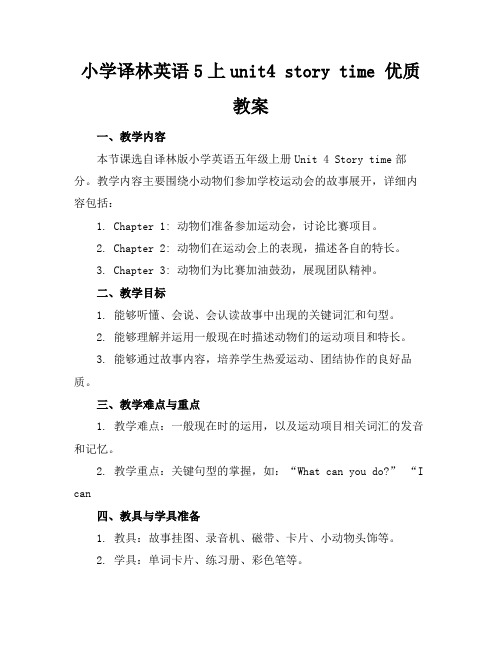
小学译林英语5上unit4 story time 优质教案一、教学内容本节课选自译林版小学英语五年级上册Unit 4 Story time部分。
教学内容主要围绕小动物们参加学校运动会的故事展开,详细内容包括:1. Chapter 1: 动物们准备参加运动会,讨论比赛项目。
2. Chapter 2: 动物们在运动会上的表现,描述各自的特长。
3. Chapter 3: 动物们为比赛加油鼓劲,展现团队精神。
二、教学目标1. 能够听懂、会说、会认读故事中出现的关键词汇和句型。
2. 能够理解并运用一般现在时描述动物们的运动项目和特长。
3. 能够通过故事内容,培养学生热爱运动、团结协作的良好品质。
三、教学难点与重点1. 教学难点:一般现在时的运用,以及运动项目相关词汇的发音和记忆。
2. 教学重点:关键句型的掌握,如:“What can you do?” “I can四、教具与学具准备1. 教具:故事挂图、录音机、磁带、卡片、小动物头饰等。
2. 学具:单词卡片、练习册、彩色笔等。
五、教学过程1. 导入:教师展示运动会图片,引导学生谈论运动会相关话题,激发学生兴趣。
2. 新课内容展示:播放故事动画,让学生跟随故事发展学习新词汇和句型。
3. 例题讲解:教师选取故事中的关键句型,进行讲解和示范,指导学生进行模仿练习。
4. 随堂练习:学生两人一组,运用新学的词汇和句型进行对话练习。
5. 小组活动:学生分组,根据故事内容编排运动会场景,进行角色扮演。
六、板书设计1. 关键词汇:以卡片形式展示运动项目词汇,如:run, jump, swim等。
2. 句型:用不同颜色的粉笔书写关键句型,如:“What can you do?” “I can七、作业设计1. 作业题目:根据故事内容,编写一篇关于运动会的小短文。
My favorite sports dayOn the sports day, all the animals are excited to take part in the games. The rabbit can run very fast. The monkeyis good at climbing. The elephant can swim. And the squirrel can jump high.I like sports day because we can have fun together. We learn to work as a team and encourage each other. It's a happy day for all of us!八、课后反思及拓展延伸1. 课后反思:通过本节课的学习,关注学生对运动项目词汇和一般现在时的掌握程度,及时调整教学方法,提高教学效果。
小学五年级英语知识点归纳
五年级上册Unit 1 my new teachersWe have a new English teacher、我们有一个新英语老师。
Who’s your English teacher?谁就是您们的英语老师?Mr Carter、He’s from Canada、卡特先生。
她来自加拿大。
What’s he like?她长得怎样?He’s ta ll and strong、He’s very fun ny、她又高又强壮。
她很滑稽。
Young funny tall strong kind old short thin strict active funny quietUnit 2 my days of the weekWha t day is it today? It’s Monday、今天星期几?今天星期一。
What do we have on Monday? 我们星期一有什么课?Let me see、让我瞧瞧。
We have English, science, computer and P、E on Monday、我们星期一有英语,科学,电脑与体育课。
What do you do on Saturday? 您星期六干什么?I often do my homework and watch TV、我通常做作业与瞧电视。
What about you/ 您呢?I often do housework and read books、我通常做家务活与瞧书。
Sunday Monday Tuesday Wednesday Thursday Friday Saturday weekday weekend tomorrow today English moral education social study Chinese science maths do homework read books watch TV play computer games do houseworkUnit 3 what’s your favouirite food?What do you have for lunch today/on Monday? 您今天/星期一中餐吃什么?We have tomatoes, tofu and fish、我们吃番茄、豆腐与鱼。
小学英语五年级上册教学计划10篇
小学英语五年级上册教学计划10篇小学英语五年级上册教学计划1一、基本情况分析五年级共有学生160多位学生,其中新生有二十几位,但是年级中英语基础相当薄弱的有五分之一左右,还是有相当一部分学生对于英语学习没有一定的规范的学习方法。
而五年级学生正处在儿童向少年过渡的时期,这个年龄段的孩子具有好奇、好活动、爱表现、善模仿等特点。
他们喜欢新鲜事物,对陌生语言的好奇心能激起他们对外语的兴趣。
五年级的学生对英语学习兴趣整体有所下降,两极分化比较严重。
所以本学期应做好待进生的转化工作。
二、教材分析教材是继承了前两个年级的学习来设计的,开心英语的教材对大部分学生来说并不陌生。
这套教材的设计使教学具有一定的弹性和灵活性,有助于因材施教。
这不仅有利于发展不同水平学生的智力与能力,也适合小学生的需要,有助于他们开心学英语。
突出兴趣培养,保护和发展求知欲,寓教于乐。
小学五年级英语教材突出对学生的兴趣培养。
教科书全部采用彩色图画,情景会话贯串全套教材。
紧密结合儿童好新奇、爱活动、善模仿、爱说、爱唱、爱跳、爱表演的特点编排和设计教材的内容与形式。
教材中安排了大量的儿童喜闻乐见的歌曲、游戏、等和一些浅显易懂的故事。
三、全册教学目标及重难点a. 全册教学目标:1) 能听、说、读、写72个单词或短语以及9组情景句子。
(包括天气季节、职业、日常用品、食物等几个话题)要求能在真实语境中正确运用并能读懂简短语篇。
1)能复习掌握好上学期所学内容。
2) 能听、说、认读每个单元的重点单词。
3) 能学会单元的情景对话训练。
4) 能听懂、会唱9首歌曲。
5) 能听懂、会吟唱18首歌谣。
6) 能完成背诵任务。
7) 能理解并复述9个小故事。
8) 能了解简单的中西方文化知识。
b. 教学重难点:教学重点:听、说、读、写四会句子,教学任务为单元的教学重点,各课的语言点、词汇和句子为重点语言知识。
教学难点:某些句子比较复杂;英语学习基础差异大,难以进行同步教学;在真实的情景中正确使用所学句型。
人教版小学英语五年级英语上册 Unit 5 B let's learn 教案
我们学习了很多方位介词,那么通过这些介词我们就可以知道物体之间的位置关系。老师想考考你的想象力。你能根据这个chant画出一幅画吗?老师相信你一定能画得非常棒,只要我们运用自己聪明的大脑,细心观察,大胆想象就会发现生活中很多美好的事物和惊喜。
看图片
描述图片
讲解
观察图片
跟读
观察图片学习词组及含义用法
3.方位介词next to和beside
你还记得我们刚开始玩的砸金蛋的游戏吗?有一只小鸡也很喜欢这个游戏,但是它是用嘴把金蛋啄破。而且一下就是两个。我们来看一下金蛋里面是什么吧!前两个金蛋是next to相邻,小鸡和金蛋按照这个方位介词的描述摆好位置了,so we can say there is a hen next to the eggs.再看一下后两个鸡蛋。是beside以及汉语意思,旁边。小鸡和金蛋按照这个位置也摆好了There is a hen beside the eggs.所以next to用于两个物体紧紧相邻,而beside用于两个物体之间有一些距离。
边听边唱
学生带着问题,进行了分步的有意义的视听,并在情景中对核心句型进行了认读、练习、和迁移的练习,让学生真正能够理解、学习、操练运用此语言点。
1.Listen and repeat.
2.Game:match.
3.Practice:
Where is the ball?
It’s...
4.Pair work:
复习介词的用法。
3.Look and say.
What’s behind the eggs?
边听边唱
对话练习
说一说
复习旧知,为学生学习新知及语言的输出做铺垫。
讲授新课
小学英语五年级课程标准
小学英语五年级课程标准王晶莹外国语是获取世界科技、文化等信息,提高民族科学文化素质,加强国际交往与合作的重要工具。
我国的改革开放政策和21世纪对人才的需要,使外语成为我国学校教学中的一个不可缺少的部分。
小学阶段是儿童可塑性最强的时期,也是儿童发展接近外语本族语语音和语感的最佳时期。
小学开设英语课,有利于激发儿童学习英语的兴趣,打好进一步学习英语的基础。
学习英语,有利于提高儿童的语言能力,开阔儿童的视野,培养儿童的综合素质。
一教学目的:小学英语教学的目的是:通过生动活泼的课堂教学活动,对学生进行基本的听、说、读、写训练,使学生打好语音、语调基础,掌握一定的词汇和最基本的语法知识,培养学生基本的日常会话能力以及拼读、拼写能力。
同时,注重培养学生学习英语的兴趣,使他们喜欢学习英语和使用英语,为他们升入中学继续学习英语奠定初步的基础。
在英语教学过程中,培养学生良好的思想品德和行为习惯。
二、教学要求小学五年级:4课时/周×70周=280课时(注:每小课时220分钟;每课时=40分钟)语音、语调输入和读写并行阶段:听、说、读、写全面训练。
(1)能够听懂课堂用语,基本听懂题材熟悉、难度浅于教材课文、语速为每分钟80词左右的听力材料。
(2)在能够用正确的语音、语调朗读所学的单词、词组和课文的基础上,掌握所学重点单词、固定短语和基本句型的基本用法。
能够用正确的语音、语调说出所学单词400个左右,能够拼写所学常用单词250个左右。
(3)能够在所学语言知识范围内进行日常会话。
(4)能够阅读与教材课文难易程度相当的原版简易图画故事。
(5)能够书面回答与课文有关的问题,能写便条式的、以双方信息交流为主的英语。
(6)理解以下时态:一般现在时、现在进行时、一般过去时。
掌握所学规则动词的词形变换。
能识别所学实义单词的词性。
三,教材分析:本册书共分为十二个单元,每个单元都列出了明确的语言目标,主要的功能项目与语法结构:Unit1 come with me!主要是复习上一册书所学过的内容就具体事物进行简单的询问Is this your dictionary? No, it’s not.What does she do? She is a teacher.Unit2 do you have any glue?对所有物进行简单的询问和描述Do you have any envelopes? Yes, I do.//No, I don’t.Does she have any stamps? Yes, she does.Unit 3 what do we need?对所需要的东西进行简单的询问和描述What do we have? We have some sugar.Do we have any salt? No, we don’t. But we need some tofu.Unit 4 review对前三个单元的复习和稳固。
- 1、下载文档前请自行甄别文档内容的完整性,平台不提供额外的编辑、内容补充、找答案等附加服务。
- 2、"仅部分预览"的文档,不可在线预览部分如存在完整性等问题,可反馈申请退款(可完整预览的文档不适用该条件!)。
- 3、如文档侵犯您的权益,请联系客服反馈,我们会尽快为您处理(人工客服工作时间:9:00-18:30)。
八、连词成句。
(10分)
1.this, are, what, you, to, going, weekend, do(?)
_______________________________________________________________
2.shop, the , coffee, is, to, next, the, drugstore(.)
_______________________________________________________________
3.there, is, park, a, the, city ,in (?)
_______________________________________________________________
4.Tian’anmen Square, grandparents, going, am, I , with, my, to(.)
_______________________________________________________________
5.do, you, what, to, want, do, there (?)
_______________________________________________________________
九、阅读理解。
(10分)
China is a big country. There are many beautiful and famous cities to visit. In northeast, the most famous city is Harbin. It’s really very cold in winter. So people there make many pretty ice lanterns. Many people in China spend their Spring Festival in Harbin. Do you want to go there? If you want, please search more information on the Internet.
( )1.China is ________.
A.big
B.small
C.little
( )2.There are ________ cities in China.
A.many
B.lot of
C.a lots of
( )3.People in Harbin are good at ________.
A.making kites
B.making dragon boats
C.making ice lanterns
( )4.Harbin is in ________ of China.
A.east
B.north
C.northeast
( )5.Many people go to Harbin in ________.
A.summer
B.winter
C.spring
四、选择填空。
(20分)
( ) 1 Go straight and turn left _______ the second crossing.
A. at
B. on
C. to
( ) 2 What's _________ hobby?
A. Angel
B. you
C. her
( ) 3 A: Is there a museum in your city?
B: No, ____________.
A. there is
B. there isn't
C. there aren't
( ) 4 The bookstore is next _______ the bank.
A. at
B. to
C. on
( ) 5 A: _______ are you going to do this weekend?
B: I'm going to the post office.
A. Where
B. What
C. Why
( ) 6 A: Do you often make phone calls to your friends?
B: Yes, __________.
A. I don't
B. I do
C. you do
( ) 7 The supermarket is across ________ the hotel.
A. to
B. in
C. from
( ) 8 I want to go to Japan ________ ship.
A. on
B. by
C. for
( ) 9 A: What is your hobby?
B: My hobby is _________.
A. read stories
B. play computer games
C. collecting dolls
( ) 10 Li Jing has a cell phone. He wants to ________ to his father with it.
A. send a short message
B. write a letter
C. mail a postcard
五、交际运用,在Ⅱ栏中找出Ⅰ栏中问句的答语,并将序号填入题前括号内。
(10分)
Ⅰ
( )1 Where do you come from?
( )2 What do you want to do on Sunday?
( )3 Who’s this?
( )4 What’s his hobby?
( )5 What are you going to do this weekend?
Ⅱ
A. I’m going to Tian’anmen Square with my gra ndparents.
B. I come from China.
C. His hobby is reading stories.
D. We want to swim.
E. This is Jack.。
